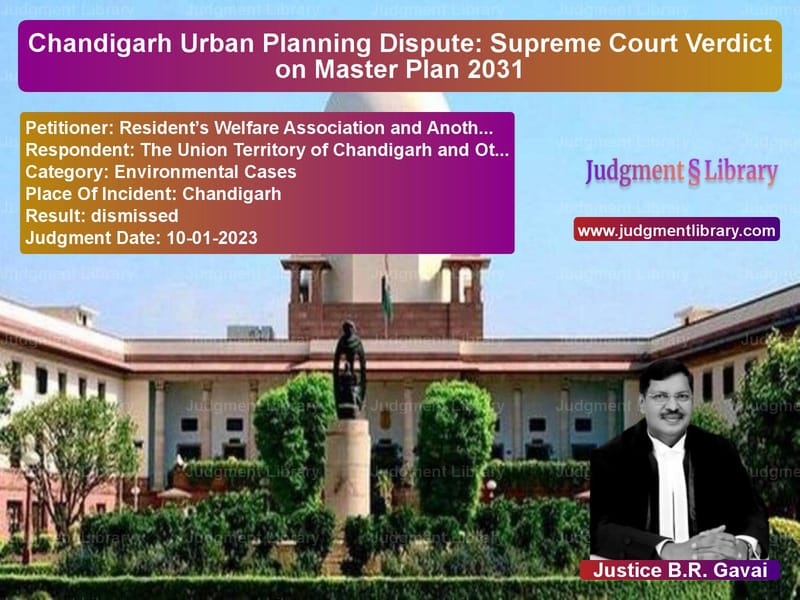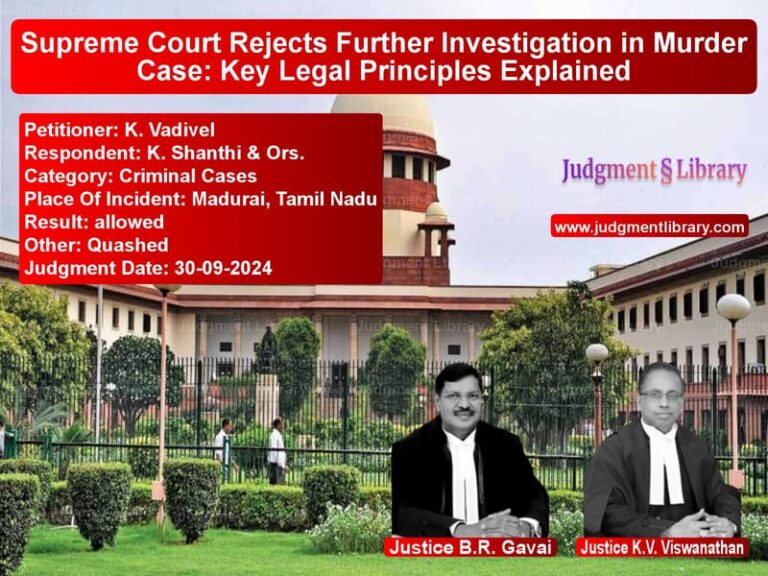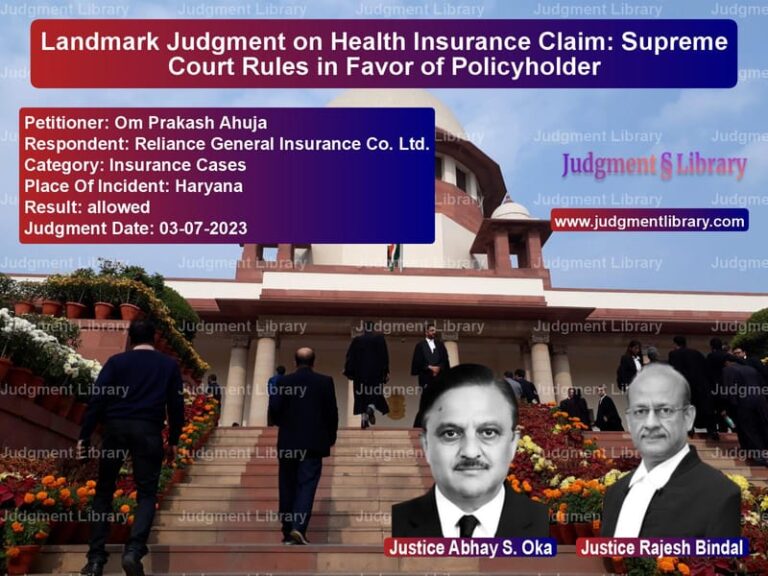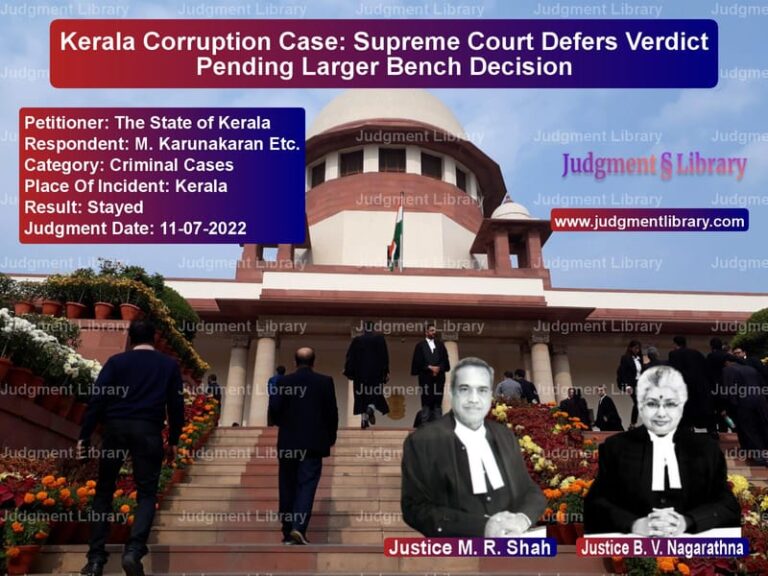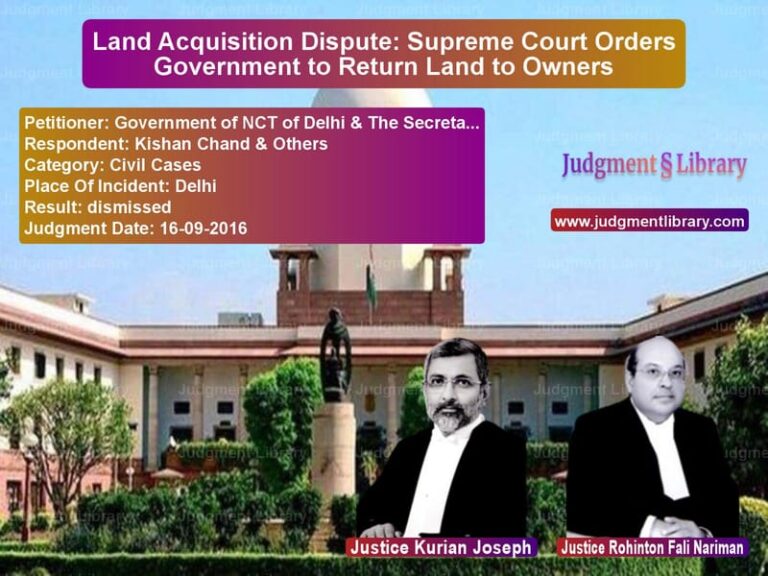Chandigarh Urban Planning Dispute: Supreme Court Verdict on Master Plan 2031
The case of Resident’s Welfare Association and Another vs. The Union Territory of Chandigarh and Others was brought before the Supreme Court regarding the legality of modifications to the Chandigarh Master Plan 2031. The petitioners, representing the Resident’s Welfare Association, challenged the proposed changes, citing environmental and urban planning concerns. The respondents, including the Union Territory of Chandigarh, defended the modifications as necessary for sustainable growth.
Background of the Case
Chandigarh was designed as a planned city post-independence by French architect Le Corbusier, and its Master Plan 2031 was developed to guide its future growth while preserving its unique character. The petitioners argued that proposed amendments allowing increased commercial activity in certain residential zones violated the original vision of the city.
According to the petitioners, the changes would have adverse consequences, including increased traffic congestion, environmental degradation, and a loss of the city’s unique identity. They contended that the modifications were not subject to proper consultation with the public and failed to address key sustainability concerns.
Arguments by the Petitioners
The petitioners contended:
- “The modifications to the Master Plan disrupt the planned residential environment and violate established zoning laws.”
- “Increased commercialization will strain existing infrastructure and harm the ecological balance.”
- “The process of amending the Master Plan lacked transparency and did not involve adequate public consultation.”
- “The environmental impact of increased commercial activities has not been adequately assessed.”
- “The amendments disproportionately benefit real estate developers at the cost of residents’ quality of life.”
Arguments by the Respondents
The respondents countered:
- “The modifications are in line with modern urban planning principles and will foster economic growth.”
- “A balance must be struck between heritage conservation and evolving needs of the city.”
- “Environmental impact assessments were conducted, and necessary safeguards were put in place.”
- “The amendments comply with regulatory frameworks and do not violate any legal provisions.”
- “Public consultation was carried out through various stakeholders, and adjustments were made accordingly.”
Key Observations by the Court
Justice B.R. Gavai observed:
“While the Master Plan serves as a guiding document, it is not immutable. The needs of a growing city must be accommodated within a rational and lawful framework.”
The Court acknowledged the concerns of the petitioners but held that:
- “Regulatory changes should be assessed holistically, considering economic, social, and environmental factors.”
- “Adequate public participation in urban planning processes must be ensured.”
- “Authorities have a duty to balance development with environmental sustainability.”
- “A city’s growth must be aligned with modern planning strategies while ensuring that residents’ concerns are addressed.”
- “Commercialization, when regulated properly, can lead to greater economic prosperity without adversely affecting residential neighborhoods.”
Legal Precedents Considered
- Olga Tellis vs. Bombay Municipal Corporation (1985): Established the principle that urban planning decisions must consider the right to livelihood and quality of life of residents.
- MC Mehta vs. Union of India (1996): Highlighted the importance of environmental considerations in urban planning decisions.
- Rajiv Sarin vs. State of Uttarakhand (2011): Emphasized the need for sustainable development while allowing for urban expansion.
- Manoj Misra vs. Union of India (2017): Addressed how unchecked urbanization could lead to environmental degradation and the necessity of following regulatory procedures.
Final Judgment
The Supreme Court dismissed the petition, ruling that the amendments to the Master Plan were lawful and within the discretionary powers of the Chandigarh administration. However, it directed authorities to enhance transparency in future urban planning exercises and to ensure that public concerns were adequately addressed before implementing major modifications.
Implications of the Judgment
- The ruling establishes that city planning documents like the Master Plan can be modified to meet evolving needs, provided due process is followed.
- It reinforces that courts will not interfere with planning decisions unless they are found to be arbitrary or in violation of statutory requirements.
- It highlights the necessity of balancing urban expansion with environmental sustainability.
- The decision serves as a precedent for future urban planning disputes in India, ensuring that both economic development and ecological considerations are given due weight.
Conclusion
The Supreme Court’s ruling in this case underscores the principle that urban planning policies must be dynamic to accommodate changing socio-economic needs. However, the judgment also emphasizes the importance of maintaining transparency and public participation in the process. The decision ensures that regulatory authorities have the discretion to make necessary modifications while being held accountable for their impact on residents and the environment. This landmark ruling sets a critical precedent for urban development across India, balancing modernization with sustainability.
Petitioner Name: Resident’s Welfare Association and Another.Respondent Name: The Union Territory of Chandigarh and Others.Judgment By: Justice B.R. Gavai.Place Of Incident: Chandigarh.Judgment Date: 10-01-2023.
Don’t miss out on the full details! Download the complete judgment in PDF format below and gain valuable insights instantly!
Download Judgment: resident’s-welfare-a-vs-the-union-territory-supreme-court-of-india-judgment-dated-10-01-2023.pdf
Directly Download Judgment: Directly download this Judgment
See all petitions in Environmental Cases
See all petitions in Public Interest Litigation
See all petitions in Judgment by B R Gavai
See all petitions in dismissed
See all petitions in supreme court of India judgments January 2023
See all petitions in 2023 judgments
See all posts in Environmental Cases Category
See all allowed petitions in Environmental Cases Category
See all Dismissed petitions in Environmental Cases Category
See all partially allowed petitions in Environmental Cases Category

